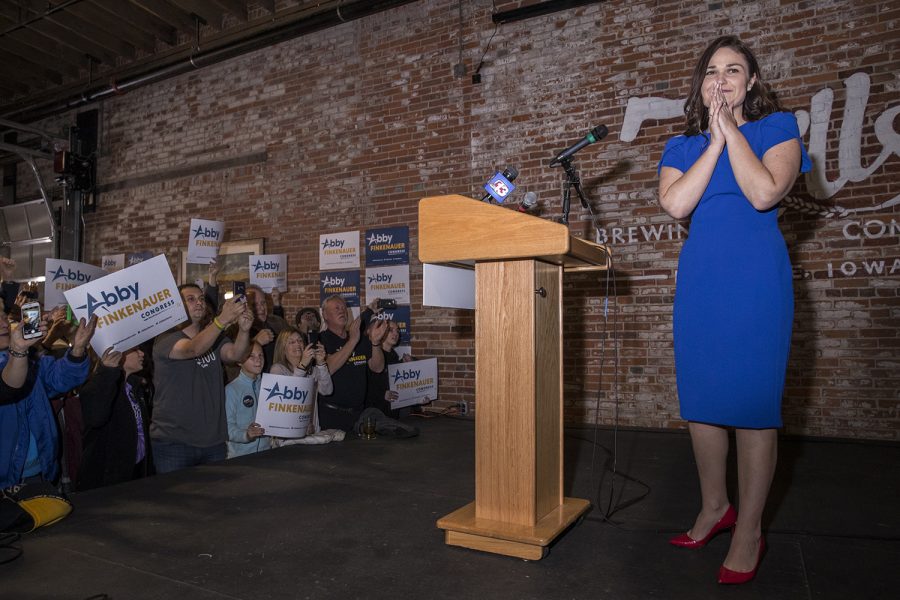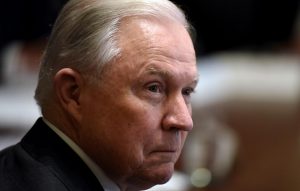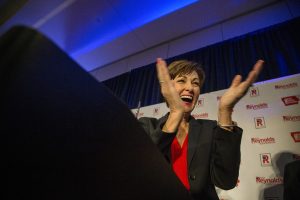Who won Iowa on Tuesday? Women.
A record number of women were elected into office in Iowa in the midterm elections, and most are touting collaboration and representation to be at the forefront of their agendas.
Democratic candidate for Iowa’s first congressional district Abby Finkenauer is greeted by supporters during a watch party at 7 Hills Brewing Company in Dubuque, Iowa on Tuesday Nov. 6, 2018. Finkenauer defeated incumbent Republican Rod Blum and, along with Alexandria Ocasio-Cortez, NY-14, becomes one of the first women under 30 elected to the U.S. House of Representatives.
November 8, 2018
Before Nov. 4, 2014, Iowa had never sent a woman to Congress nor elected a woman to the governor’s office.
Now, in a historic election night for Iowa women, two of the four U.S. representatives and the governorship are held by females.
Democratic Reps.-elect Cindy Axne and Abby Finkenauer toppled male incumbents to become the first female U.S. representatives in Iowa history. They will join a record number of women in Congress next session, in which female lawmakers will make up 22 percent of Congress, up from the current 20 percent.
Kim Reynolds, a Republican, is now serving as Iowa’s first elected female governor. She broke another ceiling after her predecessor, Terry Branstad, was appointed as the U.S. ambassador to China, and she became the first woman to hold the office in May 2017.
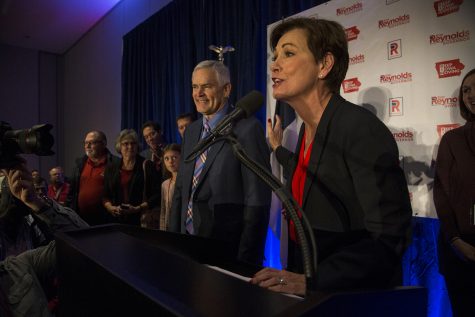
Re-elected Gov. Kim Reynolds addresses her supporters at the Hilton in Des Moines on Wednesday, Nov. 7, 2018. Reynolds defeated her opponent, Democratic candidate Fred Hubbell.
“[Iowa] is a place where a small-town girl from rural Iowa, daughter of a factory worker and a farmer, and a mom who chose to stay home and raise her family could one day become the first female governor of the state of Iowa,” Reynolds said in her victory speech Tuesday night.
RELATED: Kim Reynolds wins, becoming Iowa’s first elected female governor
Sen. Joni Ernst, R-Iowa, was the first woman Iowa sent to Washington after the 2014 midterm elections.
Axne said at Democratic gubernatorial candidate Fred Hubbell’s watch party that she and the elected female candidates have begun texting.
“This is what you get with women,” Axne said. “We collaborate, we become friends — we are sharing information so when we get out there in January, we can hit the ground running.”
Axne said she will work to ensure women make the same amount of money for a job as man does, to expand better paid family leave for men and women, and to create affordable childcare.
RELATED: Abby Finkenauer unseats Republican Rod Blum in Iowa’s 1st District
A record number of women were also elected to serve in the state Legislature, with 33 serving in the Iowa House and 11 in the Senate. Previously, 35 women served overall.
Those numbers mark a 29 percent increase in the number of women elected in the Legislature, said Kelly Winfrey, the interim director of the Carrie Chapman Catt Center for Women & Politics at Iowa State University.
She said more women holding political office could mean a fresh approach to solving problems.
According to the National Conference of State Legislatures, 28 women served in the 100-seat Iowa House before the 2018 midterm elections.
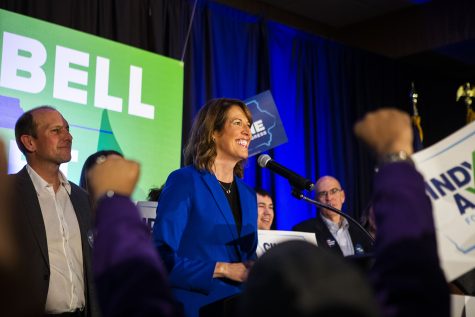
Cindy Axne, newly elected to represent Iowa’s 3rd Congressional District, speaks to supporters during the statewide Democratic candidates’ watch party at Embassy Suites in Des Moines on Wednesday, Nov. 6, 2018.
In total, 23.3 percent of the Iowa Legislature was made up by women prior to the election Tuesday. Iowa landed below the national average for women serving in state legislatures, 25.4 percent.
RELATED: Cindy Axne flips Iowa’s 3rd District blue, unseating David Young
Melissa Gesing, the executive director of 50-50 in 2020, an Iowa organization committed to achieving equal representation in government, said half of Iowa’s congressional delegation being women is a good start to achieving gender equity in the Legislature.
“I am encouraged [that the] results from across Iowa could be a pacesetter for the rest of the country,” Gesing said. “Women tend to be great collaborators, and with the current political sphere, we look to women to be able to influence change.”



